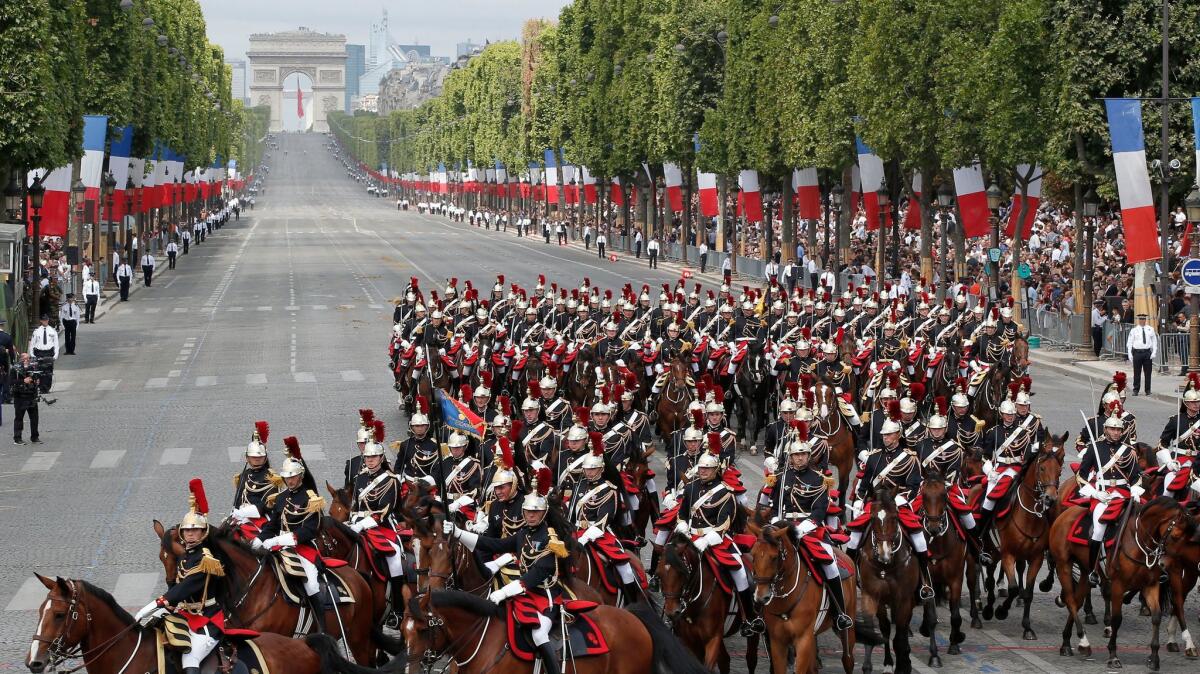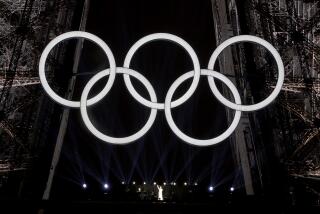Op-Ed: July 14 is a much more complicated holiday than the term ‘Bastille Day’ suggests

- Share via
Today, Paris is fluttering with blue-white-and-red, tricolored flags, vibrating to the cadenced steps of French soldiers and echoing to renditions of “La Marseillaise.” It’s the 14th of July, a date as iconic as our own Fourth of July. But while Americans have marked and celebrated the Fourth almost from the very beginning, France needed nearly a century to settle on the 14th as their national holiday.
What accounts for this delay? The story of the 14th is more complicated, its significance more complex than is commonly understood.
What the French call le quatorze juillet, we know as Bastille Day. This is at it should be. On that date, a great throng of Parisians besieged the city’s medieval fortress and prison. They were driven not just by practical reasons — they were seeking arms — but also by political and ethical reasons: The Bastille symbolized the arbitrary, unchecked powers of the French monarchy. Horror stories associated with the Bastille were legion, mostly tied to the infamous lettre de cachet: the arrest order, as readers of Charles Dickens’ “A Tale of Two Cities” know, issued by the monarchy without just cause or judicial process.
While the Revolution’s bloody origins could not be denied, neither could they be acclaimed.
Never mind that when the revolutionaries sprung open the dungeon doors after a fierce battle, there were only seven prisoners, mostly crooks or madmen, including a wizened old man dubbed by his guards as “Major Immensity.” Nevertheless, in a preview of the bloody events that would soon follow, the thickening crowd, incensed over the deaths of fellow fighters, paraded the Bastille’s commander through the streets before pummeling him to death. His head then was sawn off with a penknife and displayed on a pole pour encourager les autres (roughly, to send a message).
One year later, the organizers of an official anniversary celebration called the Festival of the Federation tried to airbrush the taking of the Bastille. They downplayed the palpable class violence and sought instead to embrace the entire nation, bringing all of France to “the great national table.” This was not empty chatter. Aristocrats and workers, bourgeoisie and artisans had worked together to prepare for the festival. The parade, which lasted more than two hours under torrential rain, included civilians and soldiers, politicians and revolutionary militias. Arriving in France that same day, British poet William Wordsworth sensed joy everywhere, like the “perfume of spring.”
Soon after, however, le quatorze juillet, a victim of the Bourbon Restoration, disappeared from holiday calendars the way the 13th floor disappeared from most American buildings. It was there, but unacknowledged, persona non grata at a national table where kings and emperors again presided. No table was long enough to seat the revolutionary values of liberty, equality and fraternity with the counterrevolutionary values of autocracy, inequality and hostility toward others.
As a result, the date led a furtive and forbidden existence, its memory kept alive by those committed to republic ideals. It was only with the overthrow of the second (and lesser) Bonaparte and establishment of the Third (and wiser) Republic in 1870 — oddly, the same year our long de facto national holiday became official — that July 14 could be celebrated again.
It took France 10 more years to decide which July 14, though. Behind door one was the taking of the Bastille in 1789, while behind door two was the making of the Federation in 1790. The choice of doors meant a choice of destinies. 1789 pointed to the “national razor” — a.k.a., the guillotine — while 1790 pointed to national celebration. But the choice wasn’t simple: While the Revolution’s bloody origins could not be denied, neither could they be acclaimed. And so, in order to bring conservatives and radicals together, the Republic chose not to choose. Or, rather, to choose both.
During the parliamentary debate in June 1880, the Parisian deputy who proposed the official holiday, Bernard Raspail, declared that the Bastille’s fall and Festival’s parade were joined at the hip. The first event drew the curtain “on the old world and inaugurated a new world of justice, humanity and equality,” while the second event, by bringing together French from all walks of life, will “teach them to understand and love one another, and so establish our nation’s unity on an indestructible foundation.”
For this year’s festivities, France has invited U.S. President Trump, the herald of the so-called Trump Revolution. The president thus will have a front-row seat to recall the true meaning of revolution, one dedicated to the ideals of liberty, equality and fraternity, and predicated on the need for national unity.
Robert Zaretsky teaches at the University of Houston and is completing a book on Catherine the Great and the French Enlightenment.
Follow the Opinion section on Twitter @latimesopinion or Facebook
More to Read
A cure for the common opinion
Get thought-provoking perspectives with our weekly newsletter.
You may occasionally receive promotional content from the Los Angeles Times.









